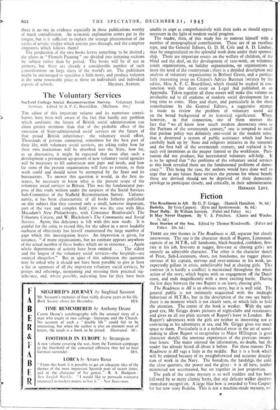The Voluntary Services
Nu field College Social Reconstruction Survey. Voluntary Social Services. Edited by A. F. C. Bourdillon. (Methuen. 16s.) THE editor of this important volume and its numerous contri- butors have been well aware of the fact that hardly any problem which confronts the future of British social administration can claim greater attention than that of the probable effect of the extension of State-administered social services on the future of that proud British inheritance : the voluntary social effort. Thousands of persons connected, sometimes for the best part of their life, with voluntary social services, are asking today how far their own institutions will be absorbed into the State, how far, as an alternative, it might be expected that even after such a development a permanent up-growth of new voluntary social agencies will be necessary to fill unforeseen new gaps and needs, and how far some of the present organisations will have to remain, as their work could and should never be attempted by the State and its bureaucrats. To answer this question it would, in the first in- stance, be necessary to know what is the present scope of the voluntary social services in Britain. This was the fundamental pur- pose of this study written under the auspices of the Social Services Sub-Committee of the Nuffield Reconstruction Survey. Unfortu- nately, it has been characteristic of all books hitherto published on this subject that they covered only a small, however important, part of the vast and complex field ; this was the case with Miss Macadam's New Philanthropy, with Constance Braithwaite's The Voluntary Citizen, and W. Blackshaw's The Community and Social Service. Again, this deficiency is felt with this new study. It is painful for the critic to record this, for the editor in a most laudable outburst of objectivity has herself enumerated the large number of gaps which this investigation leaves. An impression is given, for instance, " of many organisations, but no estimate appears anywhere of the actual number of these bodies which are in existence.... Again whole departments of activity have been omitted. . . . The oldest and the largest of the voluntary social services—the hospitals—are omitted altogether." But in spite of this admission the question may be asked why it should not have been possible to give at least a list or summary of all the important voluntary social services, by groups and otherwise, mentioning and stressing their practical sig- nificance, and, where possible, indicating how far they have been
unable to cope as comprehensively with their tasks as should appear necessary in the light of modern social progress.
The reader, then, of this study has . to content himself with a number of monographical contributions. These are of an excellent type, and the General Editors, G. D. H. Cole and A. D. Lindsay, may be congratulated on the splendid work done under their sponsor- ship. There are important essays on the welfare of children, of the blind and the deaf, on the development of case-work, on voluntary youth organisations, on holiday organisations, on organisations to meet the need of the countryman ; there is a detailed description and analysis of voluntary organisations in Bethnal Green, and a particu- larly interesting essay on Citizen's Advice Bureaux (written by the editor, Miss A. F. C. Bourdillon), which should be studied in con- junction with the short essay on Legal Aid published in an Appendix. Taken together all these essays will make this volume an invaluable aid to all students of modem social development for a long time to come. Here and there, and particularly in the short contributions by the General Editors, a suggestive attempt is made to review the problem of voluntary social aid on the broad background of its historical significance. When, however, in that connection, one of them stresses the fact that "we all know how much modern democracy owes to the Puritans of the seventeenth century," one is tempted to recall that puritan policy was definitely anti-social in the modern sense, that it destroyed a system of public assistance which had been carefully built up by State and religious initiative in the sixteenth and the first half of the seventeenth century, and replaced it by such evil inventions as the pauper funeral or the workhouse. Puri- tanism did not produce, but necessitated voluntary self-help. It is to be agreed that " the problems of the voluntary social services as this book revealed them are the fundamental problems of demo- cracy." This being the case, the authors would have done well to urge that in any future State services the persons for whose benefit these are devised should,. not be deprived of their democratic privilege to participate closely, and critically, in their administration.
HERMANN LEVY.






























 Previous page
Previous page